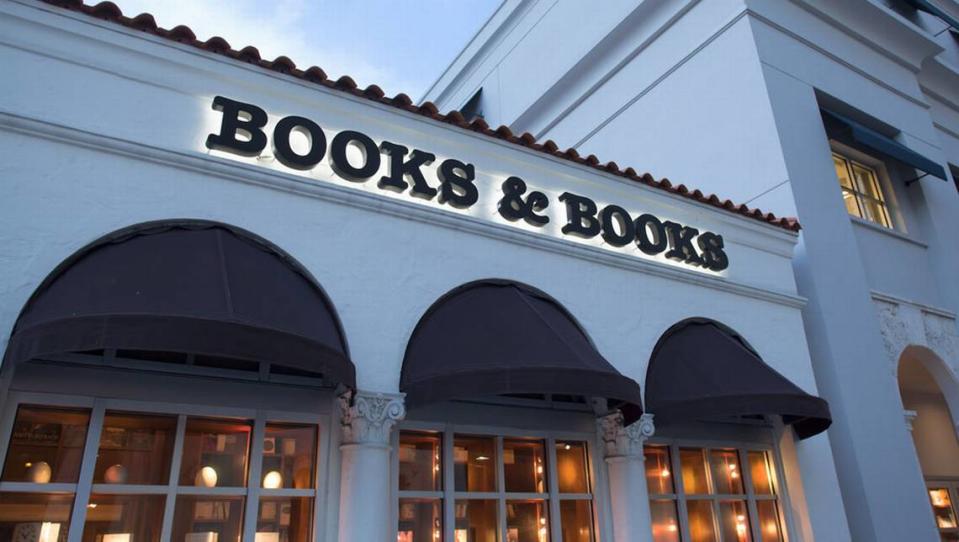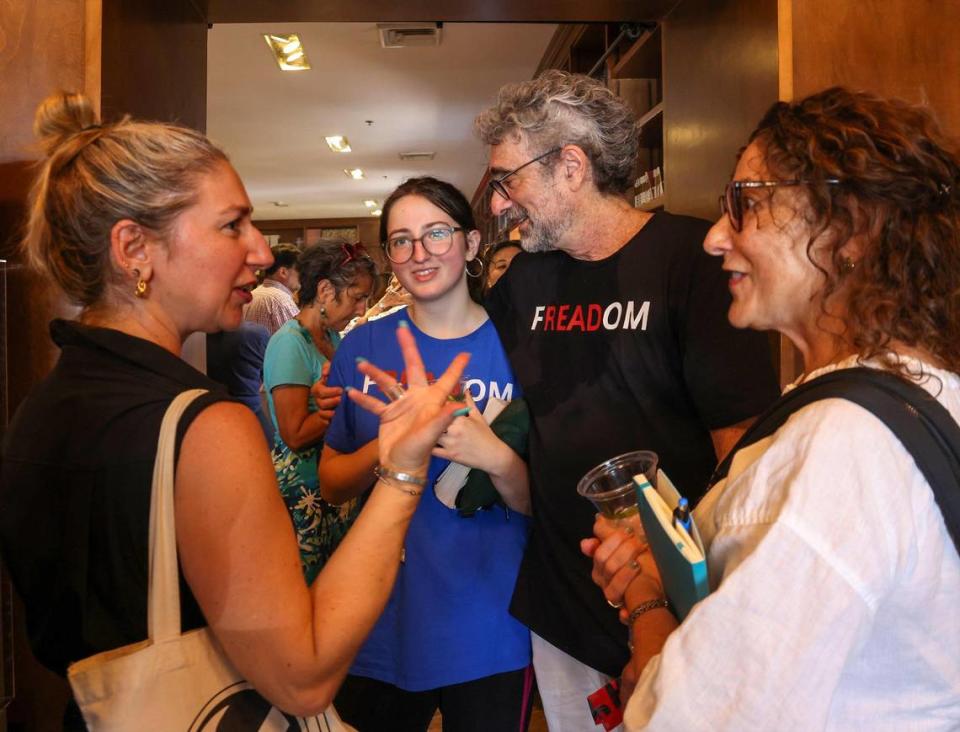Books & Books is a Miami cultural force. New foundation aims to expand influence
Books & Books, the literary haven that helped put Miami on the world’s cultural map 41 years ago, is splitting up with itself in order to expand its reach.
Fear not, the redoubtable local independent bookselling chain and its bevy of convivial readings and discussions, author appearances, impromptu coffee klatches and civic and free-speech advocacy aren’t going anywhere.
In fact, there will more of all that, and in more places than before.
Founder and owner Mitchell Kaplan is spinning off the bookstore’s popular events into an affiliated, tax-exempt nonprofit. The arrangement will allow the new Books & Books Literary Foundation to accept charitable donations and government and foundation grants to support and significantly expand the store’s public and community programs.
The idea, Kaplan said, is to make the programming self-sustaining and ensure its continuation into the future, free of commercial pressures or considerations. The ability to raise funds would also allow a long-planned expansion into schools, under-resourced communities, prisons and, perhaps, even youth sports leagues, spreading the rewards of reading and literacy well beyond the four bookstores fully owned by the chain, which remains a for-profit company.
“It’s a new way of imagining how Books & Books can continue doing what we do far into the future,” Kaplan said in an interview. “Nobody really knows what’s going to happen with retail 15 years from now. So this is about being able to do more, and at the same time securing the legacy of Books & Book, to keep doing all the community work we’ve been doing, while allowing the additional dreams we have to be uncorked.”

The Books & Books Literary Foundation will be formally launched with a special event at the chain’s Coral Gables flagship on Nov. 25 — not coincidentally a date designated as Small Business Saturday, the indie-biz movement’s answer to Black Friday and Cyber Monday. The South Florida chain owns other stores in Bal Harbour, Pinecrest and Coconut Grove. Books & Books stores in Key West and at Miami International Airport are affiliated with the chain but have separate owners.
But the Books & Books nonprofit has already been quietly operating to support campaigns against what are effectively book bans generated by Gov. Ron Desantis’ Stop WOKE Act, which has led to the removal of scores of titles from public school libraries across Florida. Books & Books co-hosted a “celebration” of the freedom to read at a Coral Gables church and has given away thousands of copies of removed books in the past year.
To help mark Pride Month, Books & Books also brought Chasten Buttigieg — who is married to U.S. Transportation Secretary Pete Buttigieg — to Miami in June through the foundation to present the young-adult adaptation of his bestelling memoir, “I Have Something to Tell You.” Already set for spring are book-related events at schools in Homestead and South Miami-Dade County, Kaplan said.
Similar models around the country
The new set-up for Books & Books was modeled in part on hybrid models adopted in recent years by other well-known independent bookstores across the country to ensure their economic survival and the continuity of their public programs at a time when the business of bookselling remains uncertain — especially given the fact that many indies largely eschew mass-market bestsellers to focus on more literary works.
The closest model may be Kepler’s Books & Magazines in Menlo Park, Calif., long a Bay Area literary hub. The 65-year-old store established an affiliated non-profit foundation several years ago to support seminars, writing workshops, youth literary events and programs in under-served schools.
Kepler’s general manager, Amanda Hall, said the split structure, in place since 2012, has been a solid success. The bookstore’s social-purpose corporate model means all profits go to living wages for store employees in the high-cost-of-living Silicon Valley. Bookstore events are ticketed to generate revenue to support the public events and also cover foundation staff wages.
“The traditional model of an independent retail bookstore wasn’t financially viable. We see independent bookstores as doing nonprofit work, and coming up with a way to make that viable was important,” Hall said. “We were trying to focus on sustainability and remaining in service to our community. To do that we needed to flip the idea of a retail bookstore to a cultural and community center to promote literacy, gets kid reading, to be a safe space for all members of the community to get together, buy a book, learn something, hang out.”
Other stores have gone fully nonprofit, including Seminary Co-Op Bookstores in Chicago, founded in 1961.

The Books & Books nonprofit was set up under the aegis of the Coral Gables Community Foundation, which acts as its fiscal agent. That means Books & Books is spared the time, difficulty and expense of setting up its own stand-alone foundation and undertaking legal and administrative functions, such as ensuring it hews to strict state and federal regulations to maintain a nonprofit status, Gables foundation president and CEO Mary Snow said.
That leaves Kaplan and his team free to focus on what they do best — selling and promoting books and developing, planning and hosting events and programs. Snow said she believes Book & Books is the first in Florida to adopt the hybrid model.
“We are quite grateful for the opportunity and realize the importance of Books & Books and Mitchell Kaplan to this community,” Snow said. “We love Mitchell and we value Books & Books’ role as one of top independent booksellers in the entire country. He is a real leader nationally.”
Kaplan said the foundation will build on decades of Books & Books community outreach. The nonprofit has a short-term fundraising goal of $100,000 by the end of this year. (Donations can be made at www.booksandbooks.com/foundation/).
A legacy and mission
Along with the Miami Book Fair — which Kaplan helped launch and which just held its 40th edition in downtown Miami this month — the bookstore virtually forged a literary scene where there was not previously much of one, bringing noted authors and the attention of the cultural world to Miami and Coral Gables.
A significant part of its mission has been building cultural bridges and emphasizing the diversity of Miami’s readers and writers, with extensive programming in Spanish and Haitian Creole.
Those programs were basically underwritten by bookstore’s revenue, which meant they could reach only so far, Kaplan said.
“The work that we’re doing in general, all our community-based work, doesn’t really generate revenue,” he said. “One epiphany I had during the pandemic, particularly during all these virtual events that we had, was that we were pretty much acting already as a nonprofit. We were funding ourselves through selling books, which is hard anyway. I thought I could do so much more if I could garner contributions.”
Now the idea is to bring that diverse programming into schools, public libraries and community centers across Miami-Dade, he said. One goal is to establish programs in which authors visit schools in communities where families may have a hard time affording books, and every kid in attendance leaves with a free book, Kaplan said. Another: to bring writers into “nontraditional spaces” to reach Miamians who might otherwise not have a chance to hear an author speak.
He is also working with Exchange for Change, a group that provides writing classes in local prisons, to establish libraries in the facilities. Eventually, Kaplan would also like to establish a mentorship programs for others looking to start bookstores in their communities, and internships for minority students interested in the publishing industry, which badly lags in diversity measures.
Finally, in what he called a “dream idea,” Kaplan — a big basketball fan — envisions linking sports and reading by establishing book clubs at local youth hoop leagues.
“We could call it ‘Books and Buckets’ or something like that,” he said with a laugh.

